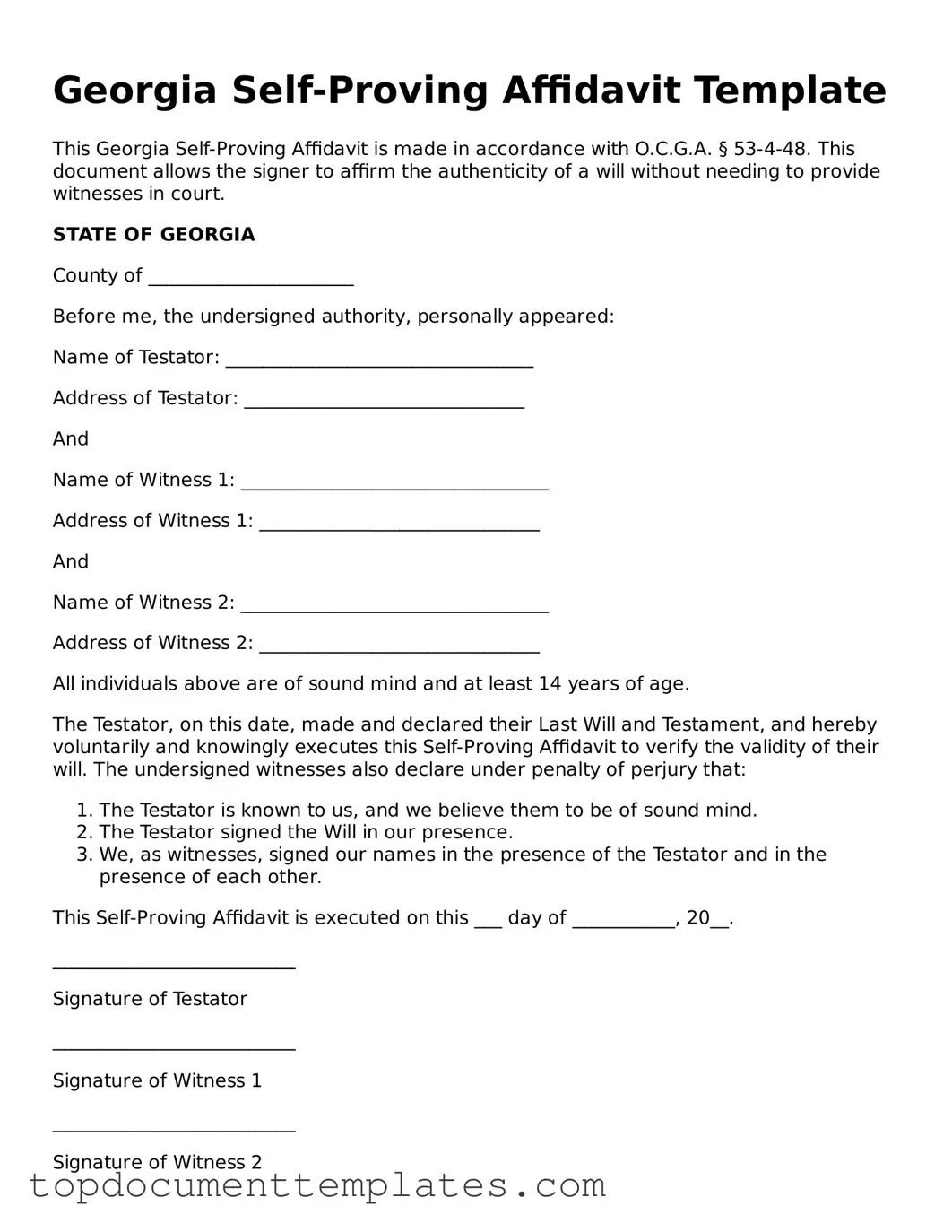Valid Self-Proving Affidavit Form for Georgia State
The Georgia Self-Proving Affidavit is an essential legal document that plays a pivotal role in the estate planning process. This form allows a testator, or the person making a will, to affirm the validity of their will at the time of signing. By including this affidavit, individuals can streamline the probate process, reducing the likelihood of disputes among heirs and simplifying court procedures. The document typically requires the signatures of the testator and witnesses, along with a notary public's acknowledgment. This combination of signatures serves to confirm that the will was executed voluntarily and in accordance with Georgia law. As a result, the Self-Proving Affidavit not only enhances the credibility of the will but also provides peace of mind for the testator, knowing that their wishes are more likely to be honored without unnecessary complications. Understanding the importance and requirements of this form is crucial for anyone looking to ensure their estate is handled according to their desires after their passing.
Similar forms
- Last Will and Testament: This document outlines an individual's wishes regarding the distribution of their assets after death. Like the Self-Proving Affidavit, it requires signatures and may need witnesses to validate its authenticity.
- Power of Attorney: This legal document allows one person to act on behalf of another in legal or financial matters. Similar to the Self-Proving Affidavit, it often needs to be notarized to ensure its validity.
- Living Will: A living will specifies an individual's healthcare preferences in case they become unable to communicate their wishes. Both documents serve to clarify intentions and require signatures to be considered valid.
- Power of Attorney: This document allows someone to make decisions on behalf of another person. To avoid any ambiguities regarding its use, learn more about the form and its implications.
- Trust Document: This establishes a trust to manage assets on behalf of beneficiaries. Like the Self-Proving Affidavit, it often requires formal execution and may involve witnesses to ensure its enforceability.
- Affidavit of Heirship: This document is used to establish the heirs of a deceased individual. Similar to the Self-Proving Affidavit, it involves sworn statements and may need to be notarized to confirm the identities and relationships of the heirs.
Guidelines on Writing Georgia Self-Proving Affidavit
Once you have the Georgia Self-Proving Affidavit form in hand, you can begin the process of filling it out. This form is typically signed in the presence of a notary and witnesses, so ensure that you have the necessary individuals available to complete the process.
- Start by entering the date at the top of the form. This is usually the date when you and the witnesses will sign the affidavit.
- Fill in your name and address in the designated spaces. This identifies you as the testator.
- Provide the names and addresses of the witnesses. There should be space for at least two witnesses who can attest to your signature.
- Next, write a statement declaring that you are of sound mind and that you willingly signed your will. This statement is crucial for validating your intent.
- Each witness must then sign their name in the appropriate section. Make sure they also print their names clearly beneath their signatures.
- After the witnesses have signed, the notary public will need to acknowledge the signatures. This usually involves the notary signing and stamping the form.
- Finally, review the entire document to ensure that all information is accurate and complete before submitting it with your will.
File Information
| Fact Name | Details |
|---|---|
| Purpose | The Georgia Self-Proving Affidavit allows a will to be validated without the need for witnesses during probate. |
| Governing Law | This form is governed by O.C.G.A. § 53-4-48. |
| Eligibility | Any individual who is at least 14 years old can serve as a witness to the affidavit. |
| Execution | The affidavit must be signed by the testator and witnesses in the presence of a notary public. |
| Notary Requirement | A notary public must acknowledge the signatures on the affidavit for it to be valid. |
| Form Availability | The form can be obtained from legal websites or local probate courts in Georgia. |
| Revocation | A self-proving affidavit does not revoke a will; it simply enhances its validity. |
| Storage | It is advisable to store the self-proving affidavit with the original will for easy access during probate. |
| State-Specific | This affidavit is specific to Georgia and may not be valid in other states. |
| Legal Advice | Consulting with an attorney is recommended to ensure proper execution and compliance with state laws. |
Other Popular Self-Proving Affidavit State Forms
What Is a Self-proving Will - The self-proving affidavit is typically signed by the testator and witnesses during the will execution.
How to Make an Affidavit - This document should be stored safely with the original will for reference during probate.
Oath of Witness to Will Florida Form - It encourages honest communication about wishes for asset distribution after death.
The California REG 262 form is essential for ensuring a smooth transfer of ownership for vehicles or vessels, covering vital aspects such as the bill of sale and odometer disclosure. For detailed guidance and resources on completing this form, you can visit onlinelawdocs.com/, which provides valuable information to help navigate the process efficiently.
Self Proving Affidavit Texas - Inclusion of this form can significantly reduce future legal complications for heirs.
